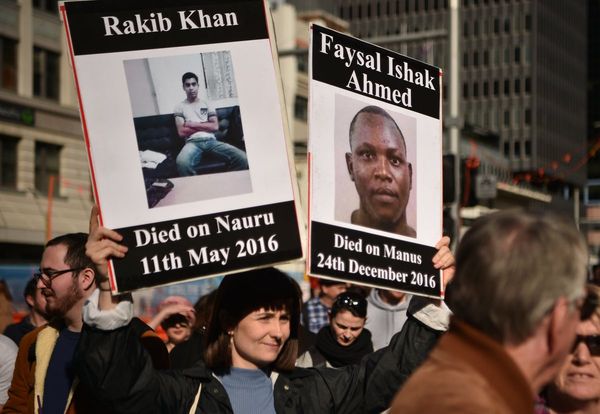
Another week, another phantom menace for Rishi Sunak. The people he is talking about, regarding his benefit reforms, do not exist. The 1.35 million people who could work but just don’t want to, who have a label of depression or anxiety but are just a little bit sad, who could have their benefits replaced by vouchers and find that incentivising: these people do not exist.
People are not signed off work because we are all a little bit more comfortable talking about our moods. People are not on disability benefits because Prince Harry did a podcast. We don’t have a “sicknote culture” because it’s too easy to get a sicknote. The pressure on GPs will not be lifted by parcelling out sicknotes to private contractors. Those with depression and anxiety severe enough to claim a personal independence payment (Pip) are catastrophically unwell. If numbers have surged over the past 14 years, which they have, it is because Conservative governments make you catastrophically unwell.
Pushback on this new narrative of cruelty has so far been pathetic: at the most, you might hear a minister challenged on the scarcity of NHS mental health provision. All that is true: child and adolescent mental health services in particular are now so poor as to be almost nonexistent. There are areas of the country where a child can wait so long for help that by the time it arrives, four years later, they are no longer a child. In a grim, idiotic irony that is the trademark of a government that marries callousness to incompetence, the more severe your illness, the more labyrinthine and inaccessible the treatment: hospital trusts might meet the referral targets for psychotic episodes, but most then fail to meet the standard for providing treatment. Waiting times for severe mental illness besides psychosis aren’t recorded and people describe it as endless limbo.
But the problem starts further up the pipeline: our mental health is worse because our general health is worse. “Britain is objectively sicker than it was a decade ago,” the epidemiologist Michael Marmot wrote in January. Poverty is driving down life expectancy and driving up infant mortality – and, along the way, it’s destroying people’s sanity. Being chronically hungry – as the UN rapporteur noted in November, with some horror, that many people are in Britain – harms your state of mind, as does not being able to feed your children.
Debt, precarious housing, low wages, punitive benefit sanctions – any one of these factors might reasonably cause a person to fear for their existence. Successive Conservative governments have driven a large number of people to despair and now they want to engage us in a conversation about snowflakes. We shouldn’t dignify it.
If the premise is built on an untruth, it is not surprising that no single point is true, either. Mel Stride, the work and pensions secretary, is calling these ideas the “biggest welfare reforms in a generation”, but 14 years is much less than a generation and, in this time, welfare has been reformed significantly. Universal credit, introduced 11 years ago, was never benchmarked to a meaningful assessment of need, with the result that 90% of households claiming it, as of last summer, are unable to afford the essentials.
If that was the intention – to move low-income families on to the breadline – that is hands down the most successful reform the Tories have enacted. Pip, the benefit these reforms are coming for, was itself a reform of the disability living allowance. It is known for assessment criteria so harsh and nonsensical that, if anxiety isn’t one of your symptoms at the start of it, it generally is by the end.
The whole wheeze is underpinned by the fact that Sunak doesn’t have time to make meaningful changes to anything. Maybe he thinks he is laying a trap for Labour. Maybe he thinks the injection of fresh cruelty will boost his support in the local elections. If there is anything more disgusting than the sight of a half-billionaire rolling up his sleeves for a “benefits crackdown” in the middle of a cost of living crisis, the realities of which he wouldn’t be able to imagine even if it occurred to him to try, I can’t think of it.
• Zoe Williams is a Guardian columnist
Do you have an opinion on the issues raised in this article? If you would like to submit a response of up to 300 words by email to be considered for publication in our letters section, please click here.







